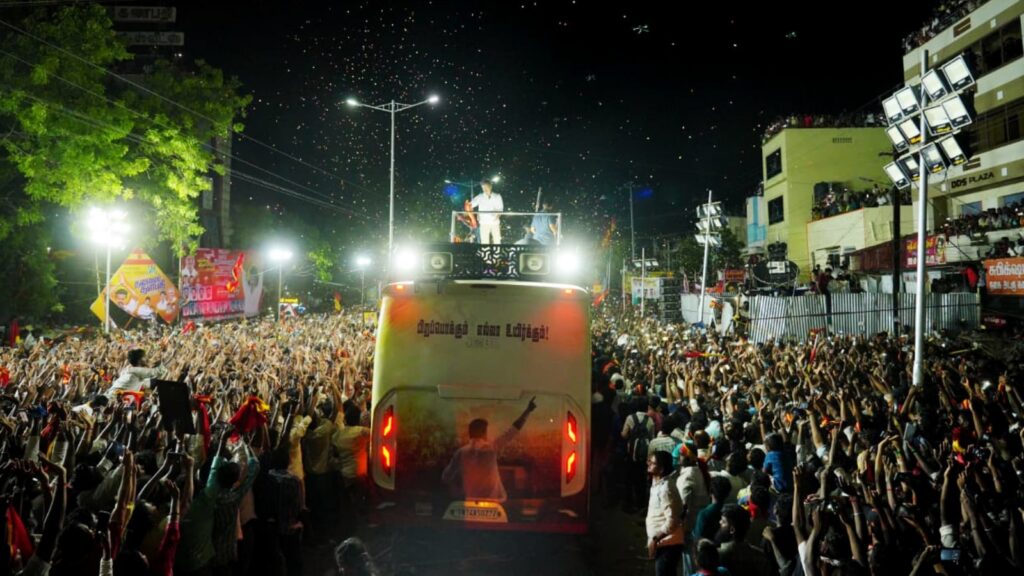The crowd at Vijay’s event in Karur on Saturday night was less a political assembly and more a sea of fans desperate to see their superstar from close quarters so they could have a glimpse, a selfie, a story to tell. In that frenzy, when some supporters who had climbed atop a tree branch fell on the people behind Vijay’s campaign van, panic rippled outward and turned a rally into a catastrophe.
Thirty-eight people died, among them 16 women and six children, and more than 100 are admitted to hospitals across Karur and Trichy. Many are fighting for their lives. Dr D Sundaresan, professor at Karur Medical College, said 48 people – 23 men and 25 women – are being treated there.
The disaster has highlighted the combustible mix of Tamil Nadu’s enduring movie fandom and its politics, where actors often blur the line between celebrity and power. Tamilaga Vettri Kazhagam (TVK), the new political vehicle of actor Vijay, is still in its infancy. Its rallies, however, have already acquired the aura of blockbuster releases: unpredictable, emotional, and often unmanageable.
“This is not a political crowd in the first place,” said Gopalan Ravindran, a retired professor of communication at the Central University of Tamil Nadu who has studied the culture of mass rallies. “It is a transient crowd. They are Vijay fans, but not yet party workers. They are like strange, beautiful and monstrous. You can’t symbolise it. You can’t control it. And sometimes it turns monstrous.”
His metaphor underscores a truth: though they wear party scarves and carry flags, the faces at Vijay’s rallies are less party cadre than cinema devotees. At Namakkal earlier on Saturday, five people collapsed in the sun before Vijay arrived. That meeting ended at 4 pm. By the time Vijay reached Karur at 7 pm, a distance of 50 kilometres, after a three-hour journey, the crowd had swelled beyond the promised numbers.
Permission had been granted for 10,000 people, with 500 police deployed. Organisers told police they expected no more. But by dusk, tens of thousands filled the ground – it was around 30,000 when the stampede happened, according to sources who were at the spot as witnesses and on official duty.
A week earlier, AIADMK leader Edappadi K Palaniswami had drawn 25,000 people to the same location without incident.
Story continues below this ad
Restrictions and rebellion
For weeks, Vijay has made political capital out of his battles with the police over restrictions at his rallies. In Trichy, a few days ago, he mocked officers for telling him not to wave too much or smile at the crowd. “Oh my god, this is semma comedy,” he said, looking straight into the camera. “CM sir, are you threatening me? You got it wrong.”
TVK has also gone to court, arguing that the DMK government imposes “onerous and discriminatory” conditions on its events. At a hearing on September 18, the Madras High Court asked the state to consider collecting security deposits from all political parties, so that any damage to public or private property could be compensated. The case was triggered by a petition from TVK itself, which accused police of imposing 23 separate conditions on its Trichy rally, including one barring pregnant women and the elderly.
The court noted that under existing law, political parties are liable for damage caused by their cadre, but enforcement has been weak. “Strict conditions must be imposed,” Justice N Sathish Kumar said, urging a framework of deposits and accountability.
That question of accountability now looms large. Critics argue that TVK cannot disown the character of its gatherings. “It is no longer just a fan crowd,” said a senior IPS officer who is familiar with the event and arrangements. “If you want the power of mass rallies, you must also accept the responsibility.”
Story continues below this ad
The state government, meanwhile, was caught in a bind. Public anger due to the inconveniences caused by Vijay’s rallies was sharp, but so too is the sensitivity of cracking down on an immensely popular film icon in an election season. Any move that appears to discriminate against TVK could deepen its outsider appeal.
A culture of crowds
Tamil Nadu has lived with the culture of massive political gatherings for decades, nurtured by the film-politics nexus. C N Annadurai, M G Ramachandran, and J Jayalalithaa were all film stars before they became chief ministers. Their rallies routinely drew lakhs.
What is new is the sheer intensity of Vijay’s fandom in the digital age. His supporters flood social media, mobilise WhatsApp groups, and converge in convoys that overwhelm small towns. Saturday’s rally was permitted as a fixed-point meeting, with a strict ban on road shows. Yet fans followed his car from Namakkal to Karur, swelling the grounds before he arrived.
Ravindran likened the phenomenon to Lacanian psychology. “In human development, there is an imaginary stage, a symbolic stage, and the real,” he said. “What we see here is the real — something monstrous, that defies explanation in language.”
Story continues below this ad
On Saturday, around 10 pm, families were waiting outside hospitals for news. The government announced a Rs 10 lakh compensation for each victim and authorised emergency transfers to private hospitals to save lives. Chief Minister M K Stalin flew to Trichy at 1 am from Chennai to oversee relief. Vijay flew back to Chennai, avoiding the media but meeting police and party men on the way.

